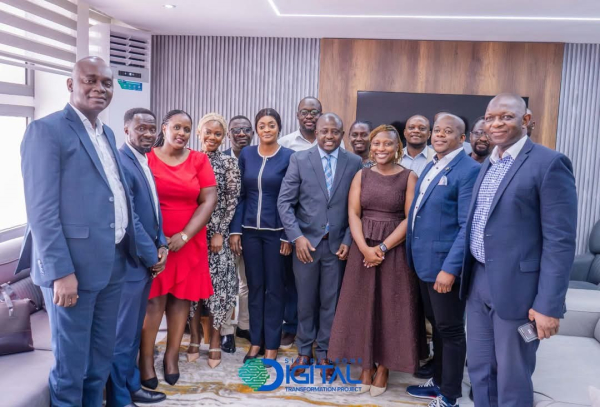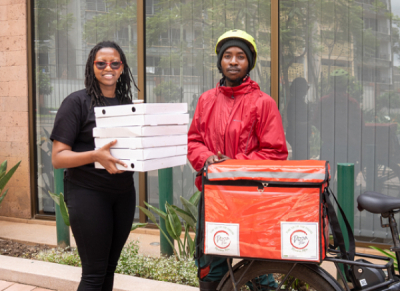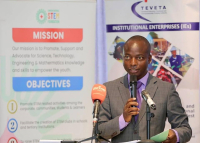Digital case management and automation can cut administrative inefficiencies, reducing opportunities for bribery and favoritism. A transparent and technology-driven legal system ensures fairer outcomes, increasing citizen confidence in the rule of law.
On March 24, the Ministry of Justice officially launched the development of the e-Justice Blueprint, a key initiative under the Sierra Leone Digital Transformation Project. This is a step toward modernizing the justice system.
The inaugural meeting at the Ministry of Justice headquarters in Freetown convened senior government officials, legal professionals, and key stakeholders committed to fostering a more efficient, transparent, and technology-driven justice system. Notable attendees included the Minister and Attorney General, the Deputy Minister of Justice, and the Project Coordinating Unit, led by Project Coordinator Kumba Musa. Also present were representatives from the Canadian Academic and Industrial Network (CAAIN), the consulting firm leading the blueprint’s development.
The e-Justice Blueprint will provide a strategic framework for integrating digital solutions into Sierra Leone’s justice sector. It aims to assess current legal systems and identify existing gaps, outline technical, legal, and institutional strategies for digital justice implementation, enhance service delivery, strengthen accountability, and uphold the rule of law.
The initiative seeks to establish a more accessible, user-friendly, and integrated justice system, ensuring citizens receive faster, more efficient legal services while improving transparency and trust in the judicial process.
Sierra Leone’s decision to develop the e-Justice Blueprint stems from several longstanding challenges in its justice system, including corruption, limited access to legal services, and inefficiencies. These issues have hindered the rule of law, economic growth, and public trust in the legal system.
The country ranked 108 out of 180 countries in the 2023 Transparency International Corruption Perception Index (TI-CPI), an annual survey conducted by global civil society watchdog Transparency International to assess perceived levels of public sector corruption worldwide.
Sierra Leone’s ranking highlights persistent corruption challenges within the public sector, including the judiciary. This underscores the urgent need for judicial reforms and digital interventions, making the e-Justice Blueprint a critical step in addressing these issues.
By leveraging technology, Sierra Leone is laying the foundation for a fairer, more accessible, and development-friendly justice system, ensuring that legal services reach more citizens while promoting investment and economic growth.
Hikmatu Bilali
In a world where purchasing power is often under pressure, access to flexible payment solutions has become a necessity. PayJustNow offers an innovative response in South Africa, allowing consumers to buy now and pay in three interest-free installments.
PayJustNow, a fintech solution developed by a South African startup, provides consumers with a straightforward way to manage their purchases by splitting the cost into three equal, interest-free installments. Founded in Cape Town in 2019 by Craig Newborn, Greg van der Riet, and Mark McChlery, the platform offers a flexible payment option for shoppers.
"PayJustNow is evolving from South Africa’s favourite BNPL provider, to a payment platform offering a full suite of credit options, and connecting South African consumers and retailers, providing a one-stop shopping experience," stated Dean Hyde, who assumed leadership of the startup in 2022 following its acquisition by Weaver Fintech, a Mauritius-based entity.
The PayJustNow solution is accessible through a mobile application available on both iOS and Android platforms, which has been downloaded over one million times, according to the Google Play Store. To utilize the service, users must be at least 18 years old, reside in South Africa, possess a valid debit or credit card, and have an active email address and mobile phone number. Once an account is approved, users can immediately begin shopping.
When selecting PayJustNow as a payment method, the total purchase amount is divided into three equal payments. The initial payment is made at the time of purchase, with the remaining two installments due over the subsequent two months. Importantly, the service operates without interest charges, and fees are only applied in the event of a late payment. This structure offers consumers an alternative to traditional credit options, making goods and services more accessible without immediate financial burden.
Merchants also benefit from integrating PayJustNow, typically experiencing increased sales and enhanced customer loyalty.
As of March 2025, the fintech solution has reached 2.5 million users and is integrated with over 3,000 businesses, spanning across 10,000 points of sale throughout South Africa.
By Adoni Conrad Quenum,
Editing by F eriol Bewa
Specializing in logistics optimization, the startup leverages AI to revolutionize logistics in Africa. In addition to Kenya, its country of origin, it has expanded to four other countries across the continent and plans further expansion in the coming months.
Kenyan startup Leta provides an e-logistics solution leveraging artificial intelligence to streamline delivery operations for businesses across Africa. The platform optimizes delivery routes, offers real-time shipment tracking, simplifies payments, and transforms shipping data into actionable insights for its users.
Founded in 2022 by Nick Joshi, the Nairobi-based company has recently secured $5 million in a seed funding round in March 2025. The investment was led by Speedinvest, with participation from Google’s Africa Investment Fund and Equator, a climate-focused venture capital fund operating in Africa. This capital injection is earmarked to enhance Leta's product offerings and solidify its position as a leading logistics technology platform for businesses across the continent. The company also intends to expand its footprint into strategic markets within Africa, including Rwanda and Mauritius.
Leta distinguishes itself through its software-centric model, which avoids the complexities of asset ownership or aggregation. Instead, the company partners with existing fleet owners, providing them with the technology to enhance their operational efficiency and optimize vehicle utilization. This approach contrasts with many other African logistics startups that have adopted a more asset-intensive model, often facing operational hurdles.
The startup is also exploring the integration of financial services to further support businesses. These include initiatives such as fuel cards for delivery partners, asset financing for vehicles and devices, and supply chain financing for fast-moving consumer goods merchants. These offerings aim to create additional growth opportunities for businesses throughout the African continent.
Since its inception, Leta reports having facilitated over 4.5 million deliveries, transported 150,000 tons of goods, and managed a network of 7,400 vehicles. Currently operating in Uganda, Nigeria, Zambia, and Zimbabwe, the company collaborates with prominent industry players such as KFC, East African Breweries Limited (EABL), Fargo Courier, and Gilani’s, helping these organizations to reduce operational costs and improve overall efficiency in their logistics operations.
By Adoni Conrad Quenum,
Editing by Feriol Bewa
With its web and mobile platforms, this startup aims to automate retail in Nigeria. Ultimately, it seeks to transform how African SMEs manage their business operations.
Nigerian startup Bumpa provides a comprehensive mobile-based e-commerce solution designed to empower entrepreneurs with a suite of digital tools to manage and grow their businesses. The platform enables users to effortlessly create online storefronts, manage inventory, process payments, and analyze sales data directly from their mobile devices.
Founded in 2021 by Kelvin Umechukwu and the late Adetunji Opayele, who tragically passed away earlier this month, the Lagos-based company aims to streamline the operational challenges faced by small businesses.
Bumpa offers a quick and easy way for entrepreneurs to establish an online presence, expanding their reach to a wider customer base through instant website creation. The platform also provides real-time inventory tracking, helping businesses minimize potential losses. Furthermore, it supports both local and international payment processing, allowing businesses to accept payments in both Nigerian naira and US dollars.
"We’re trying to solve the inefficiencies small businesses face, because most of them have operated in a black hole for a very long time. They don’t have enough data or information on what’s going on, what’s being sold, and how their products are being sold," Kelvin Umechukwu explained to TechCrunch in 2022.
The Bumpa dashboard provides entrepreneurs with valuable insights into their business performance, including profit margins, average customer spending, and top-selling products, enabling data-driven decision-making.
While a comprehensive suite of features is available through an annual subscription of 150,000 naira (approximately $98), the startup also offers a free plan and other subscription options to cater to various business needs.
In October 2022, Bumpa secured $4 million in a funding round led by Base10 Partners, with participation from investors including Plug & Play Ventures, SHL Capital, Magic Fund, and FirstCheck Africa. This investment has supported the expansion of the team, the improvement of internal processes, and the overall growth of the startup.
Beyond its web platform, Bumpa also offers a user-friendly mobile application available on both iOS and Android devices, which has already garnered over 100,000 downloads on the Google Play Store, indicating strong adoption among its target audience.
By Adoni Conrad Quenum,
Editing by Feriol Bewa
- Key documents have been bsubmitted to the government
- The Documents include roadmap and work plan for drafting the legal framework, ministry confirms
- The Bill aims to support startups through tax exemptions, funding, and a new Ghana Innovation and Startup Agency
Ghana has moved closer to finalizing its Startup and Innovation Bill, with key stakeholders submitting crucial documents to Minister of Communication, Digital Technologies and Innovation, Samuel Nartey George, last week.
The submitted documents, including a work plan and roadmap, outline the strategic steps for drafting the legal instrument, the ministry said in a statement posted on Facebook. "The submission of these documents marks a significant milestone in advancing the policy framework that will enhance opportunities for startups, strengthen innovation ecosystems, and promote digital entrepreneurship in Ghana,” the statement read.
The bill, initially drafted in 2020 by the Ministry of Business Development in collaboration with the private sector, has undergone multiple revisions following stakeholder consultations. The Ministry of Communication, Digital Technologies and Innovation aims to initiate the review process by May 2025, with plans to present the bill to the National Assembly before the next parliamentary recess.
The proposed law seeks to promote creativity, innovation, and the use of new technologies to generate substantial added value and enhance competitiveness at international, regional, and national levels. Key provisions include the creation of the Ghana Innovation and Startup Agency, the establishment of a startup support fund, and tax exemptions.
Ghana's startup ecosystem is experiencing rapid growth, fueled by foreign direct investment, mentorship, training, and other support mechanisms, according to StartupBlink. The organization's "Global Startup Ecosystem Index 2024" ranks Ghana fourth in West Africa and 88th globally. Accra, the nation's capital, is ranked 268th out of 1,000 cities, and is home to prominent startups such as Mpharma, CarePoint, Zeepay, Complete Farmer, and Farmerline.
StartupBlink highlighted the potential for increased growth through a rise in female founders. However, the organization also pointed to challenges, including a lack of capacity-building resources and unattractive incorporation clauses. "Ultimately, Ghana's startup scene is still young and holds strong potential for growth," StartupBlink concluded.
By Isaac K. Kassouwi,
Editing by Sèna D. B. de Sodji
- Morocco will install 4,000 smart surveillance cameras in Rabat by end of 2025
- The $10.4 million project is led by Rabat Région Aménagements, Finatech and Alomra Group handling infrastructure and deployment
- Equiped with with facial recognition and license plate reading, the cameras aim at enhancing urban security and traffic management
Morocco is set to install 4,000 smart surveillance cameras in its capital, Rabat, by year-end, joining a global trend of increased investment in video surveillance technology driven by advances in facial recognition and automated data analysis.
The project, spearheaded by public entity Rabat Région Aménagements, carries a budget of approximately 100 million dirhams ($10.4 million). Finatech Group will handle the installation of command and data collection centers, while Alomra Group International will deploy the cameras, which will feature facial recognition and automated license plate reading capabilities.
This initiative aligns with Morocco's digital transformation strategy and its preparations for major international events, including the 2025 Africa Cup of Nations and the 2030 World Cup, which it will co-host with Spain and Portugal. The deployment aims to enhance security and improve population flow management.
According to a report by Mordor Intelligence, the global video surveillance systems market is projected to grow from $81.68 billion in 2024 to $145.38 billion by 2029, representing a compound annual growth rate of 12.22%. Several African nations, including Senegal, Côte d’Ivoire, and the Seychelles, have also recently invested in these technologies to bolster urban security and optimize public space management.
While proponents emphasize the benefits of smart surveillance in crime prevention and traffic management, concerns remain regarding personal data protection and individual freedoms. Morocco’s National Commission for the Control of Personal Data Protection (CNDP) has initiated hearings to regulate the use of these technologies and ensure compliance with Law 09-08, the country’s personal data protection law.
The challenge, as Morocco advances in smart city management, is to balance security innovation with the safeguarding of citizens’ rights.
By Samira Njoya,
Editing by Sèna D. B. de Sodji
Visa’s investment is expected to boost employment, attract more foreign investment, and stimulate Nigeria’s economy. It will help position Nigeria as a regional tech hub.
Visa Inc., a global payment services provider, has announced its intention to set up data center infrastructure in Nigeria, reaffirming its dedication to the nation's digital economy. This development was shared by Mr. Andrew Torre, Visa's Regional President for CEMEA, during a courtesy visit to Vice President Kashim Shettima at the Presidential Villa in Abuja, as highlighted in a March 21 press release from the Nigerian Presidency.
Mr. Torre stated that Visa’s continued investment in Nigeria is aimed at introducing new technologies that will enhance the country’s financial ecosystem. He highlighted that global partners like Hugo and Samsung require Visa’s technology to expand mobile payment services, making transactions more efficient and cost-effective.
The move is in addition to Visa’s over $1 billion investment in Nigeria, which includes a partnership with MoniePoint to drive digital payment adoption, $200 million investment in digital payment company Interswitch, and a collaboration with ThriveAgric to support smallholder farmers and enhance food security in Nigeria.
Visa’s planned data centre will play a key role in bolstering Nigeria’s digital payment infrastructure, improving transaction speed, cybersecurity, and access to financial services for millions of Nigerians.
Vice President Shettima welcomed Visa’s commitment to expanding its footprint in Nigeria, assuring the company of continued government support. He emphasized Nigeria’s growing fintech dominance, noting that eight of Africa’s ten leading fintech companies are Nigerian-based.
According to McKinsey's 2020 report, Harnessing Nigeria’s Fintech Potential, Nigeria is home to over 200 fintech companies, alongside fintech solutions from banks and mobile operators. Between 2014 and 2019, the sector raised over $600 million, including $122 million in 2019, accounting for 25% of Africa’s $491.6 million second only to Kenya’s $149 million.
Visa’s $1B+ investment and planned data centre reinforce Nigeria’s fintech leadership, accelerating digital transformation, financial inclusion, and economic growth.
Hikmatu Bilali
Safaricom Ethiopia announced on March 19 that it hosted GSMA on a workshop to close digital access gaps, particularly in gender and usage disparities.
Held at Safaricom Ethiopia’s headquarters, the session brought together Consumer Business Unit (CBU) employees and GSMA experts to address barriers like handset affordability and digital literacy. Participants explored scalable, sustainable solutions and outlined a roadmap to expand digital access.
This collaboration reinforces Safaricom Ethiopia’s commitment to making digital transformation inclusive and accessible for all.
The Zambia National STEM Foundation (ZNSF) and TEVETA have signed an MoU with the Zambia Federation of Employers (ZFE) and Agricultural Institute of Zambia (AIZ) to enhance Work-Based Learning (WBL) and boost STEM adoption in vocational training. The announcement was made on March 19.
Ministry of Technology and Science Permanent Secretary, Dr. Brilliant Habeenzu, emphasized the partnership’s role in closing skills gaps and aligning training with industry needs.
ZNSF remains committed to equipping Zambia’s workforce with industry-relevant STEM skills for the evolving job market.
Digital payment systems increase transparency, reduce leakages, and provide real-time tracking, ensuring more tax revenue reaches the government. By digitizing tax payments, the collaboration modernizes government collections, improves efficiency, and builds taxpayer trust through greater transparency.
The Nigerian Federal Inland Revenue Service (FIRS) has partnered with African payments technology company Flutterwave to enable digital tax collections. This was announced on March 20. It makes Flutterwave one of the few fintechs modernizing government payments.
Olugbenga ‘GB’ Agboola, CEO of Flutterwave, stated: "We are committed to leveraging technology to drive efficiency and economic growth. By simplifying tax payments, we are digitizing government collections and supporting national development in line with our mission."
Through this integration, businesses and individuals across Nigeria can now pay taxes, levies, and other obligations via Flutterwave’s secure and seamless payment infrastructure. The system offers real-time tracking, diverse digital payment options, offline payment capabilities, and enhanced transparency, ensuring a faster and more accessible tax payment experience.
According to the Nigerian Bureau of Statistics, Nigeria's tax-to-GDP ratio stood at 10.86% as of 2021. The country’s fragmented tax system, which hinders revenue growth, is cited as one of the reasons for this low figure. By digitalizing payments and improving accessibility, the collaboration centralizes tax collection, reduces bottlenecks, encourages compliance, and helps boost government revenue.
This partnership aligns with FIRS’ modernization efforts, which include the adoption of technology for transparency and efficiency, offering Nigerians a streamlined way to fulfill their tax obligations.
Hikmatu Bilali
More...
- The initiative stems from Mali Digital Awards, supporting local startups
- It offers tailored support, funding, and market access, aiming to foster "Made in Mali" digital leaders
The Malian government inaugurated the Mali Digital Accelerator on Thursday, March 20, a program designed to support the development of the national tech ecosystem. The program will provide startups with tailored support, strategic funding, and market access.
The initiative aligns with the government’s ambition to build a strong and resilient digital economy, leveraging technology for economic growth, modernization, and prosperity. The government aims to foster the emergence of "Made in Mali" digital leaders.
According to the Ministry of Communication, Digital Economy, and Administrative Modernization, the program will address challenges faced by sector players, including funding shortages, lack of mentorship, and infrastructure access difficulties.
The International Finance Corporation (IFC) supports this view, emphasizing that accelerators can unlock startup potential in emerging markets. "Accelerators scout for high-growth potential entrepreneurs and provide training, mentorship, and networking, often alongside seed capital. They help entrepreneurs grow their business faster, or recognize when their ideas are not viable, encouraging them to pivot or exit the market. Successful participation in recognized acceleration programs also signals quality to investors, helping promising firms secure additional funding," the IFC said in a report published in February 2025.
The IFC stressed that effective accelerators in low-income countries must align incentives with local market conditions. The institution recommended integrating into regional investment networks, strengthening connections with the local private sector, and fostering angel investment and venture capital networks in lower-middle-income countries.
"Accelerators can focus on specialization and scale in more developed emerging markets—creating industry-specific programs, building cross-border networks for market expansion, and connecting local startups to global value chains," the IFC added.
By Isaac K. Kassouwi,
Editing by Sèna D. B. de Sodji
Nigeria is home to one of Africa’s most dynamic tech ecosystems. However, a slowdown in funding is beginning to hinder the growth of startups. Through new initiatives, the government aims to stimulate innovation and provide essential support to emerging companies.
Nigeria plans to launch a $40 million fund to support early-stage tech startups, aiming to strengthen the country’s entrepreneurial ecosystem and reduce young companies’ reliance on private investors, officials said.
The fund will be equally financed by the Japan International Cooperation Agency (JICA) and the Nigeria Sovereign Investment Authority (NSIA), which manages the national sovereign wealth fund. Kashifu Inuwa Abdullahi, director of the National Information Technology Development Agency (NITDA), confirmed the final agreement would be signed within the next month.
The initiative is part of Nigeria’s Startup Act, adopted in October 2022, which aims to create a favorable environment for startups through tax incentives and financial support. The act established a 10 billion naira (approximately $8.6 million) annual fund to finance certified startups through seed funding, grants, or loans.
According to Disrupt Africa, Nigeria’s startup ecosystem attracted over $2 billion in investments between January 2015 and August 2022, positioning the country as Africa’s leader. Companies like Flutterwave, Andela, and Opay achieved multi-billion-dollar valuations. However, fundraising dropped to $224 million in 2023, down from $531 million in 2022 and over $1 billion in 2021. This decline highlights the need for government intervention to revitalize the tech ecosystem amid investor caution.
The new fund marks a significant step for Nigeria, which aims to foster local innovation. Currently, 12,948 companies are registered as startups, benefiting from a three-year tax exemption. Low awareness of the law’s benefits has prompted the government to plan a nationwide information campaign.
By facilitating access to funding, the initiative could strengthen support for existing startups and stimulate new tech ventures, reinforcing Nigeria’s position as a leading hub for digital innovation in Africa.
By Samira Njoya,
Editing by Sèna D. B. de Sodji
By combining modern technology with an understanding of African market dynamics, this startup aims to empower local entrepreneurs, drive innovation, and create sustainable economic opportunities.
Kola Market is an online marketplace developed by a Ghanaian startup, providing local entrepreneurs with digital tools to optimize business operations and increase profitability.
Founded in 2021 by Marie-Reine Seshie, the startup operates from Newark, United States, and Accra, Ghana.
Kola Market serves as a platform for businesses to sell inventory through efficient online sales channels, increasing visibility and commercial opportunities. The marketplace offers advanced analytics tools, enabling users to access real-time stock level information, identify best-selling products, and analyze customer purchasing trends for strategic decision-making.
The marketplace addresses challenges faced by African small and medium-sized enterprises in the commerce sector, including overstocking, order forecasting, and stock alignment. It automates the ordering process, reducing human errors and ensuring product availability. The platform utilizes artificial intelligence to align stock levels with demand, minimizing losses.
The platform is accessible through a mobile application available on iOS and Android, with more than 1,000 downloads, according to Play Store data. In April 2024, the startup was selected, along with two other startups, to receive $200,000 in pre-seed funding from Madica, an Africa-focused investment program. The funding will enable the marketplace to test new features and expand operations.
By Adoni Conrad Quenum,
Editing by Feriol Bewa
- DER/FJ and Sonatel partner to enhance digital inclusion and innovation
- Under the partnership, Bambey digital campus will become an innovation hub
- Training programs are to be delivered to youth and women through digital hubs and Orange Digital Centers
Senegal's General Delegation for Rapid Entrepreneurship of Women and Youth (DER/FJ) has entered into a strategic partnership with Sonatel, aimed at accelerating digital entrepreneurship. The partnership, formalized on Monday, March 17, seeks to enhance digital inclusion and foster a competitive digital entrepreneurial ecosystem through targeted initiatives.
The project will harness technological innovation to drive social and economic inclusion, with the partners combining resources to cultivate new leaders in the innovation sector. A key component of the collaboration involves transforming the Bambey digital campus into an innovation hub, designed to equip young Senegalese with advanced digital skills for future employment.
The partnership will also include tailored training programs for youth and women, delivered through digital hubs in regional branches and Orange Digital Centers (ODCs). These centers, which officials have noted are effective as business accelerators, will serve as platforms for a dynamic and innovative entrepreneurial environment.
This collaboration aligns with broader efforts to create an environment conducive to local talent development. It also represents a step toward achieving Senegal 2050 and the country's New Technological Deal, the national digital transformation strategy. The New Technological Deal aims to certify five hundred tech startups and create 150,000 direct jobs by 2034.
Sonatel's initiatives, including the Orange Startup Center and Orange Digital Center, have trained over 39,000 young people since 2019, with a reported 95% job placement rate in Senegal. In 2024, Sonatel invested 800 million CFA francs ($1.3 million) in Senegalese startups and supported 1,600 women through its Maisons Digitales program.
By Samira Njoya,
Editing by Sèna D. B. de Sodji















